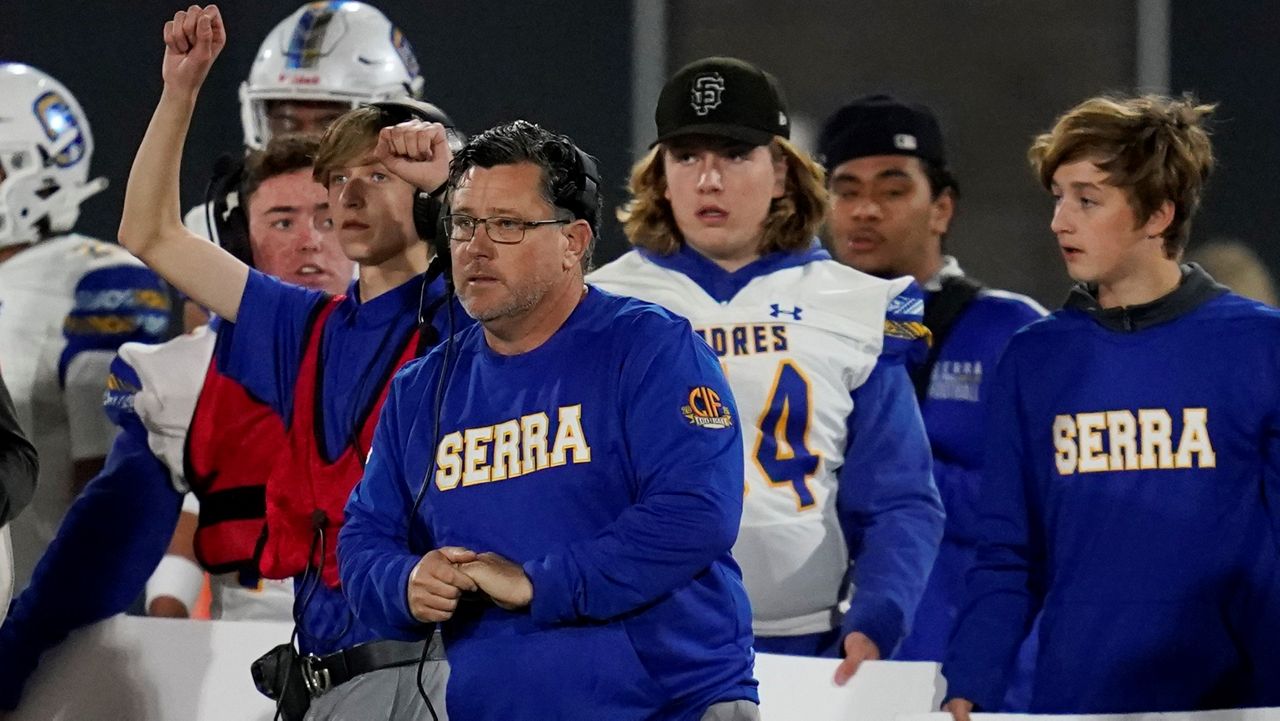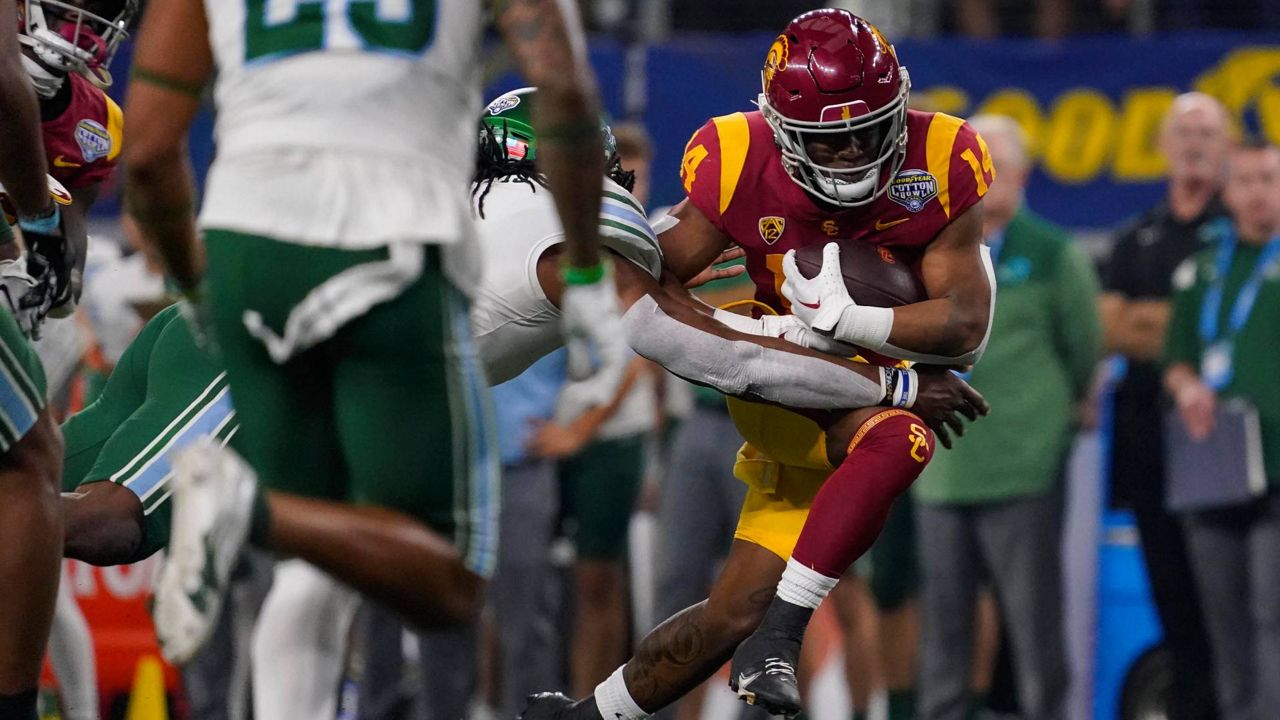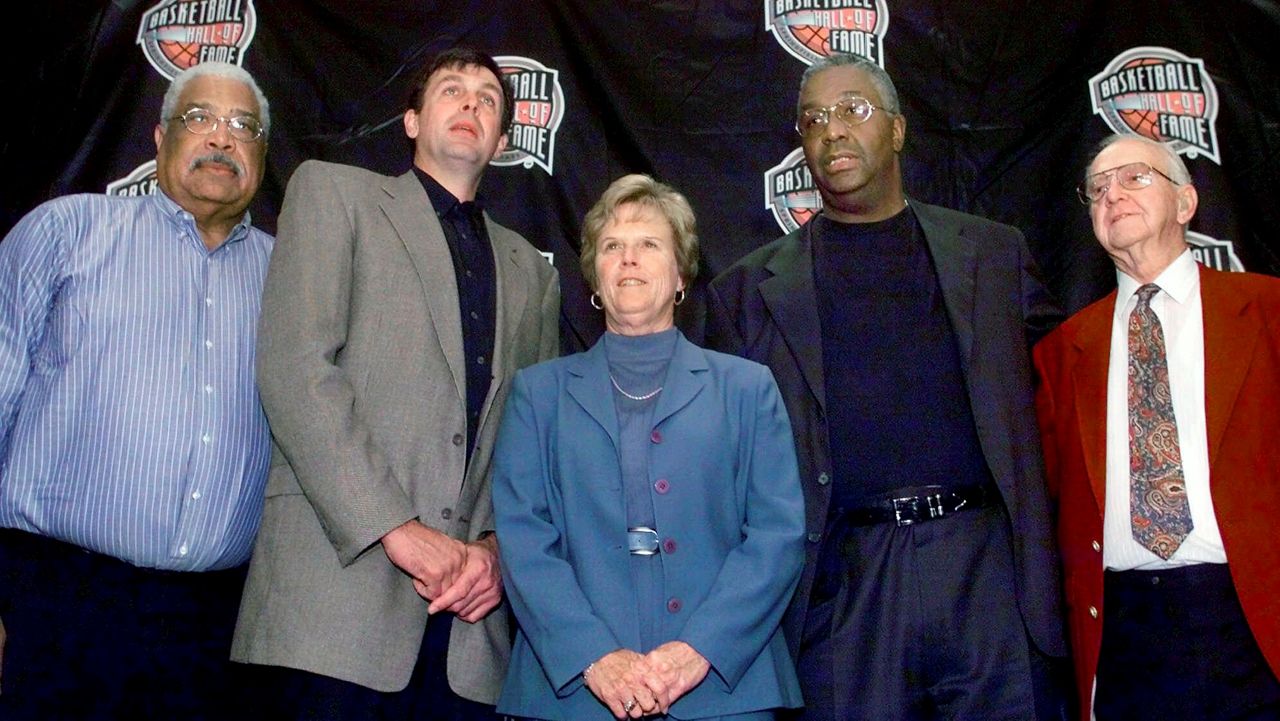Southern California and UCLA’s pending moves to the Big Ten could give the league’s existing members the opportunity to expand their recruiting maps and pursue more West Coast prospects.
It will take some time for these moves to have that kind of impact.
“I think ultimately it’s probably going to be a little bit of a slow burn,” said Andy Frank, who oversees Penn State’s recruiting department as the Nittany Lions’ director of player personnel.
The numbers bear that out.
Twelve high school juniors or seniors from states with Pac-12 programs have verbally committed to play football at one of the Big Ten’s 14 current member schools. Only four made their decisions after the June 30 announcement that USC and UCLA would join the Big Ten in 2024.
Zack Marshall, a tight end from Carlsbad (California) High School, committed to Michigan in mid-August but said the news about USC and UCLA didn’t impact his decision.
“It wasn’t much of a consideration thinking, ‘Oh, I’m going to come home and play once in a while,’" Marshall said. “The consideration was more, ‘Do I want to leave in the first place?’"
Other prospects from states with Pac-12 schools to commit to Big Ten programs since June 30 are Wisconsin quarterback recruit Cole LaCrue of Broomfield, Colorado; Michigan athlete Collins Acheampong of Rancho Santa Margarita (California) and Indiana-bound wide receiver Orlando Greenlow of Lawndale, California.
“I think It’s probably more of a long term (change)," Ohio State coach Ryan Day said. “You’ll see it over time.”
Day's team already is awaiting one huge addition from Pac-12 territory: Chandler (Arizona) junior quarterback Dylan Raiola, the nation’s No. 1 overall prospect in his class according to composite rankings of recruiting sites compiled by 247Sports, committed to Ohio State in May.
Charles Collins, the coach at Oaks Christian in Westlake Village, says he’s noticed more Big Ten schools visiting the West Coast lately.
“It used to be the bigger schools – Ohio State here or there and Michigan,” said Collins, whose school’s long list of alums to play college football includes former Michigan running back and current UCLA star Zach Charbonnet. “Now the other Big Ten schools are definitely making a little push, for sure.”
Big Ten schools generally have recruited other prospect-rich areas more than the West Coast. The list of high school juniors and seniors verbally committed to Big Ten programs includes 40 prospects from Florida but only four from California.
Patrick Embleton, Illinois’ executive director of personnel and recruiting, said it’s more convenient for prospects and their families to arrange flights from places like Florida, Atlanta or Texas to campus. He said California recruits visiting Illinois generally fly to Chicago and then go from there to Champaign.
“It’s got to be the right kid,” Embleton said. “Long story short, it’s got to be the right situation for us to really go all-in on a recruit from the West Coast.”
Nebraska interim coach Mickey Joseph, whose team has three California players on its roster, offered a similar assessment. He said Nebraska wouldn't go that far to pursue just any type of player.
“If we’re going to go out there, we’re going out there to get a draft pick,” Joseph said.
Frank said the limited numbers of days coaches are permitted to visit schools forces them to be strategic in where they go, though he believes Penn State staffers will start heading to the West Coast more often.
Greg Biggins, the California-based national recruiting analyst for 247Sports, offers a couple of other reasons for the Big Ten’s Florida-California discrepancy.
Biggins said the Big Ten style of play prioritizes controlling the line of scrimmage and that Florida is better than California at producing quality offensive linemen. Biggins also indicated Florida prospects traditionally are more receptive to out-of-state programs.
“For a lot of years, in Southern California, no matter how bad (USC) and UCLA were doing or if they were a little down, a lot of kids wanted to stay local or stay out west,” Biggins said. “Florida kids, they’re very open to leaving home.”
Of course, that reputation doesn’t necessarily apply to everyone, nor does it mean that trend will continue.
Patrick Walsh, who coaches Bay Area power Junipero Serra High School in San Mateo, says prospects at his school have become more open to considering programs outside the West Coast.
“The world has shrunk now,” Walsh said. "It’s shrunk even more when it comes to college sports. The concept of going to a Big Ten school and leaving California is definitely on the minds of a lot of kids.”
The idea could become even more intriguing in the next five or 10 years. By then, USC and UCLA may have established themselves in their new league and West Coast recruits consequently will have grown more accustomed to watching Big Ten football on television.
“If you’re 40 years old, you know the tradition and history of college football with those schools in the Pac-12 and Pac-10,” Frank said. “But fast-forward to several years from now. There’s going to be a 15-year-old you’re recruiting, and he doesn’t remember those two schools playing in the Pac-12.”
Biggins does believe that switching conferences will enable USC and UCLA to have more success landing recruits from the Midwest. That should cause the Big Ten’s current members to realize they must look more closely at prospects in the West Coast.
That already might be happening. Walsh said Michigan coach Jim Harbaugh recently attended one of Junipero Serra’s games while visiting the area for a reunion of the San Francisco 49ers’ 2012 NFC championship team.
“He mentioned to me that Michigan definitely has to recruit the Bay Area more,” Walsh said. “I think that’ll be the plan for Michigan and the rest of the Big Ten.”









